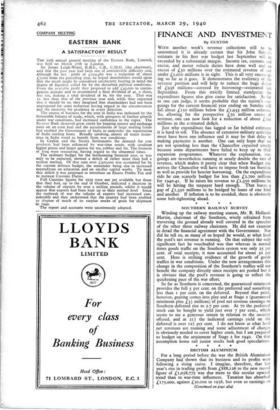COMPANY MEETING
EASTERN BANK
A SATISFACTORY RESULT
THE 30th annual general meeting of the Eastern Bank, Limited, was held on March 27th in London.
Sir James Leigh-Wood, K.B.E., C.B., C.M.G. (the chairman), said that the past year had been one of considerable difficulty and, although the net profit of £104,489 was a reduction of about £7,000 from the preceding year, he hoped shareholders would agree that the result might be considered satisfactory bearing in mind the degree of liquidity called for by the disturbed political conditions. From the available profit they proposed to add £45,000 to contin- gencies account and to recommend a final dividend of 4s. a share, less tax, making a total dividend of 6s. for the year. That was Is. less than that of the previous year and, while they regretted that it should be so, they imagined that shareholders had not been unprepared for some reduction having regard to the circumstances and the necessity for prudence in every direction. The course of business for the year in India was indicated by the favourable balance of trade, which, with prospects of further growth under war conditions, had increased confidence in the rupee. The Reserve Bank deserved great credit for keeping money and exchange rates on an even keel and the accumulation of large sterling funds had enabled the Government of India to undertake the repatriation of India sterling loans. Broadly speaking, almost all major indus- tries in India stood to benefit from war. conditions.
In Ceylon and the Straits Settlements the demand for raw products had been enhanced by war-time needs, with resultant higher prices and larger quotas for tea, rubber and tin. The finances of Iraq were reassuring, having regard to the abnormal times. The ordinary budget for the forthcoming financial year, as was only to be expected, showed a deficit of rather more than half a million sterling. Of that sum over. £300,000 was accounted for by the current defence budget, the remainder being due to increased expenditure on 'education and on smaller capital works. To meet that deficit it was proposed to introduce an Excess Profits Tax and to increase Customs Duties.
Full Customs figures for 1939 were not yet available but those that they had, up to the end of October, indicated a decrease in the volume of imports by over a million pounds, whilst it would appear that exports had been kept up to their normal level. Since the outbreak of war the volume of exports had increased con- siderably and they understood that the country had been enabled to dispose of much of its surplus stocks of grain for shipment in 1940.
The report and accounts were unanimously adopted.


































 Previous page
Previous page